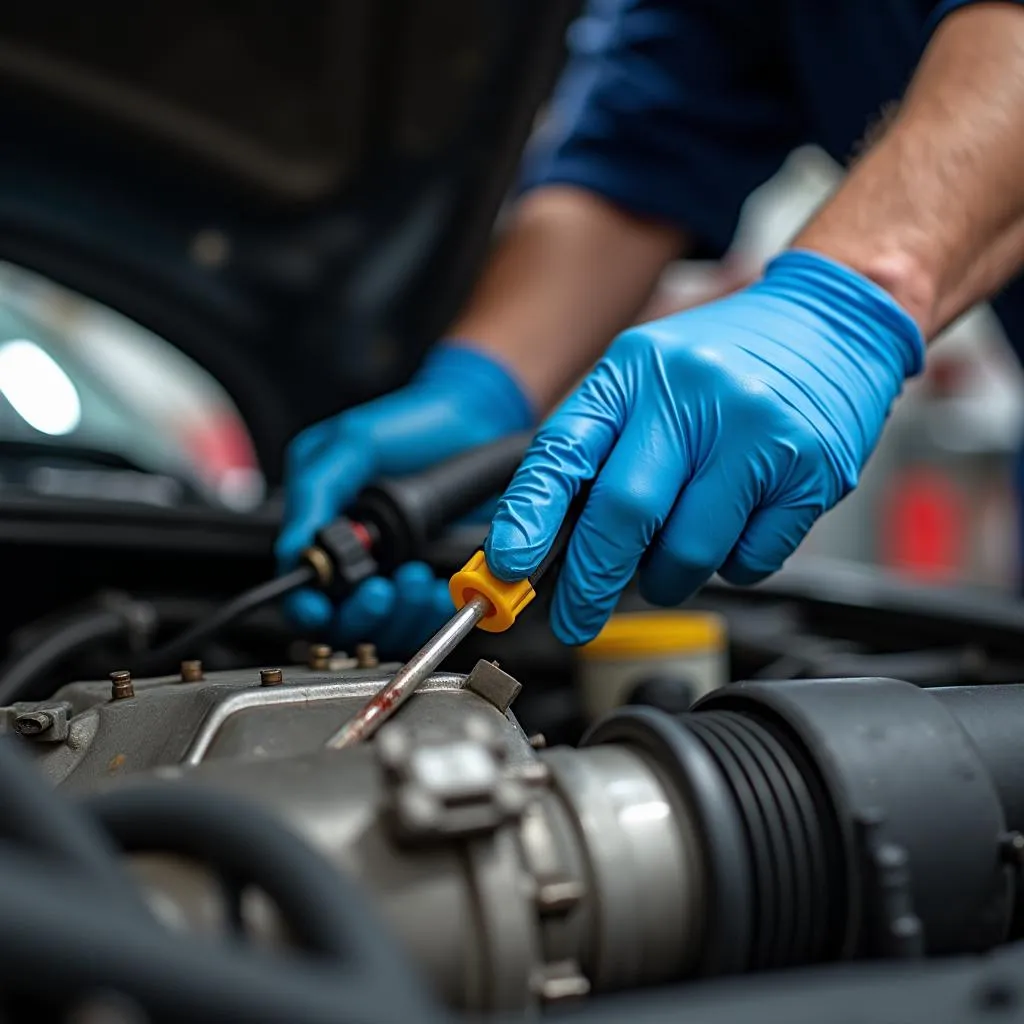Auto transmission service is a crucial part of maintaining your vehicle’s performance and longevity. It involves inspecting, cleaning, and replacing fluids in your car’s transmission system, ensuring smooth gear changes and efficient power transfer. This comprehensive guide will delve into the intricacies of auto transmission service, covering everything you need to know, from understanding its importance to determining when it’s required.
Why Is Auto Transmission Service Important?
Imagine driving your car and experiencing sudden jolts, delayed gear shifts, or even a complete transmission failure. These are all signs of a neglected transmission system. Regular auto transmission service is critical for:
- Preventing Transmission Failure: Transmission fluid acts as a lubricant and coolant, protecting delicate internal components. Over time, this fluid degrades, losing its lubricating and cooling properties, leading to wear and tear, and ultimately, transmission failure.
- Maintaining Smooth Shifting: A healthy transmission ensures smooth gear shifts, delivering a comfortable driving experience. Neglecting service can result in rough shifting, slipping gears, and even inability to shift.
- Improving Fuel Efficiency: A properly functioning transmission optimizes fuel efficiency by allowing the engine to operate at its optimal RPM range for each gear. A faulty transmission can lead to increased fuel consumption.
- Extending Transmission Life: Regular service keeps your transmission in top condition, extending its lifespan and preventing costly repairs down the road.
 Car transmission system
Car transmission system
What is Involved in an Auto Transmission Service?
An auto transmission service typically involves the following steps:
- Inspection: A mechanic will inspect the transmission fluid level, color, and condition for signs of contamination or wear.
- Fluid Change: The old transmission fluid is drained and replaced with fresh fluid.
- Filter Replacement: The transmission filter is replaced to remove debris and contaminants that could clog the system.
- System Flush: A transmission flush cleans the entire system, removing any remaining contaminants and restoring the transmission’s optimal performance.
“It’s crucial to use the correct type of transmission fluid for your specific vehicle. Always refer to your owner’s manual or consult with a qualified mechanic.” – John Smith, Certified Automotive Technician
How Often Do I Need an Auto Transmission Service?
The frequency of auto transmission service varies depending on factors such as driving habits, vehicle age, and type of transmission. However, a general guideline is:
- Every 30,000 to 50,000 miles: This is a good starting point for most vehicles.
- More Frequent Service: For vehicles with a manual transmission or those subjected to heavy towing or frequent stop-and-go traffic, more frequent service may be required.
 Mechanic inspecting transmission fluid
Mechanic inspecting transmission fluid
“It’s best to err on the side of caution and schedule a transmission service sooner rather than later.” – Susan Jones, Automotive Service Expert
Signs You Need an Auto Transmission Service
If you notice any of the following signs, it’s time to schedule an auto transmission service:
- Rough or delayed shifting: This can indicate a problem with the transmission fluid, filters, or internal components.
- Slipping gears: This suggests a problem with the transmission’s ability to engage gears properly.
- Burning smell: A burning odor coming from the transmission area is a strong indicator of overheating and potential transmission failure.
- Transmission fluid leakage: Visible leaks indicate damage to the transmission seal or other components.
- Unusual noises: Noises such as clunking, grinding, or whining coming from the transmission can point to internal problems.
The Benefits of Regular Auto Transmission Service
By maintaining a regular auto transmission service schedule, you reap significant benefits:
- Improved Driving Experience: Smooth and efficient gear changes enhance your driving experience, making every journey more enjoyable.
- Increased Fuel Efficiency: A well-maintained transmission optimizes fuel economy, saving you money at the pump.
- Reduced Repairs: Regular service can prevent costly repairs by detecting minor issues early on.
- Extended Transmission Life: By maintaining optimal performance, transmission service prolongs the lifespan of your transmission, saving you from premature replacement.
Frequently Asked Questions (FAQ)
What is the average cost of an auto transmission service?
The cost of a transmission service can vary depending on factors such as vehicle make and model, the type of service required, and your location. A basic service typically ranges from $100 to $300.
Can I change the transmission fluid myself?
While some DIY enthusiasts may attempt a fluid change, it’s highly recommended to have a qualified mechanic perform this service. The transmission system is complex and requires specialized tools and knowledge.
How long does an auto transmission service take?
The time needed for a transmission service varies depending on the complexity of the job. However, most services can be completed within a few hours.
Can I use any type of transmission fluid?
No, not all transmission fluids are compatible. Using the wrong type of fluid can damage your transmission. Always refer to your owner’s manual or consult a mechanic to determine the correct fluid for your vehicle.
Conclusion
Maintaining your vehicle’s transmission through regular service is crucial for smooth shifting, fuel efficiency, and extending the life of your transmission. By understanding the importance of auto transmission service, recognizing the signs of a problem, and staying proactive, you can ensure a comfortable and reliable driving experience. If you have any questions or require assistance with your auto transmission, reach out to a qualified mechanic for expert advice.


